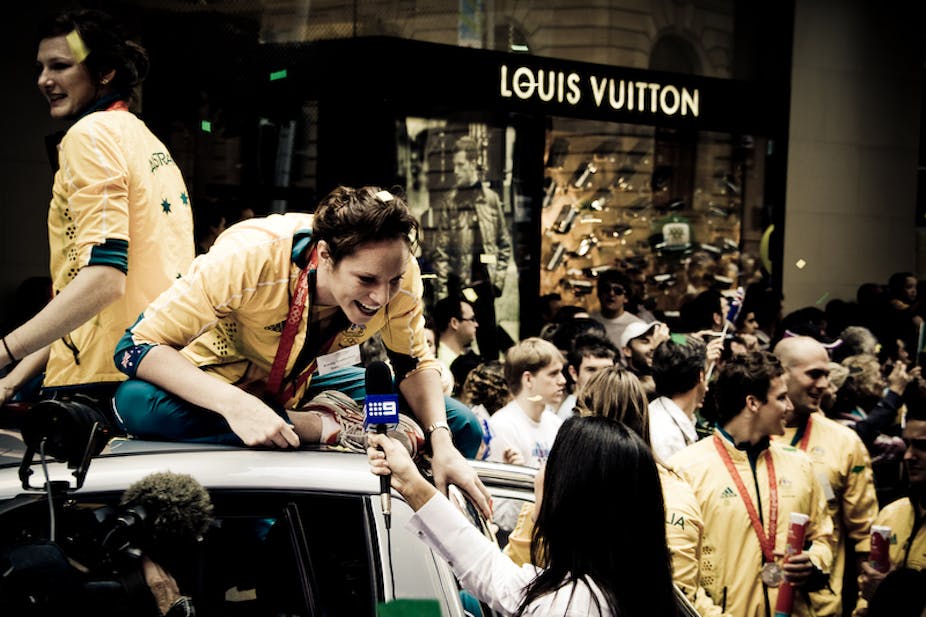Athletes are generally seen as a stoic, tough, uncomplaining lot. But the last few weeks before an Olympics always tend to bring on athletic tantrums. As the last chances for Olympic selection fade away, the papers are full of claims of unfairness, and appeals to higher bodies. So how does Olympic selection work? And what can an athlete do when it all goes wrong?
Three steps to qualify
Every sport does it differently, and it’s hard to generalise. But overall, there are three stages for qualification and selection for the games:
Qualification is controlled by the International Olympic Committee (IOC) and international sporting federations. Qualification is different for every sport, but to maximise global participation, there are quotas for various regions (Australia is in Oceania) and caps on the number of participants from any one country in each event.
-
Eligible athletes are then nominated by the national sporting federations. Again, there is a variety of approaches. Some sports hold trials to determine selection. Others judge performance over time (this has an element of subjectivity). Team sports select a squad, with final lineup determined at the games.
Final selection of the Australian Olympic team is by the Australian Olympic Committee. A selected athlete must sign the Team Agreement to take their place in the games team.
Appealing a decision
Throughout the team selection process, athletes have a right of appeal. If they think their failure to be selected was inconsistent with the Olympic qualification system, they can appeal to the International Federation Appeals Tribunal.
If it’s a dispute about nomination, they can appeal to the National Federation Appeals Tribunal. Disputes about selection by the AOC can be reviewed by the Court of Arbitration for Sport (CAS).
The CAS, based in Lausanne, is the final court of appeal in sporting matters for sports that have submitted to its jurisdiction. This includes the IOC. Athletes and federations can seek review of Tribunal decisions at the CAS. The AOC has appointed Olympic Appeals consultants to counsel athletes who have not been selected and who may be considering an appeal.
Recent selection controversies
This Olympics, a few selection controversies have hit headlines. For example, the IOC has established “A” and “B” qualifying times for athletic events. Countries’ national Olympic Committees have discretion whether to apply the “A” or “B” time.
Athletics Australia required athletes to set an “A” qualifying time before a specified date. Genevieve Lacaze ran a qualifying time in the steeplechase just after the date.
She successfully mobilised media and public opinion and the date was shifted to enable her selection.

In rowing, individual athletes or crews do not qualify; boats do, for particular events. Rowing Australia can then decide how to crew the boats that have qualified. Pippa Savage, who was rowing in a quad scull crew, was dismissed from the training squad after a clash with another crew member.
She appealed. The appeal was settled when Savage was made a “non-travelling reserve”, meaning that she could not continue to train with the team but might get called up at the last minute – to any boat!
There was a scandal when Australian weightlifter Daniel Koum allegedly demanded money before lifting at a weightlifting tournament in Samoa.
Australia had to win the tournament to take up the allocation of one place in the weightlifting competition at the Olympics. Whether or not money changed hands, Koum made his lift, Australia won the tournament, and an Australian lifter can be selected for London. Koum and Australian weightlifting officials may face disciplinary action.
Two members of the Oatley family, Lyndal and Kristy, have been selected in the equestrian team for London. They are the granddaughters of Bob Oatley, a wealthy sponsor of the sport.
Kristy had had two years out of the sport but came back just in time to be selected, despite being outranked by her rival Hayley Beresford, who has therefore missed selection.
Beresford appealed to the National Federation Appeals Tribunal without success, and then to the Court of Arbitration for Sport, also without success.
It appears the criteria weren’t incorrectly applied; rather, the selection procedures were sufficiently discretionary to enable the Oatleys’ selection.
So many standards; so many disappointments
Sports law is generally covered by contract, but the Olympics are a very special case. The International Olympic Committee likes to regard itself as an international organisation with its president having the title of Excellency, like an ambassador.
Countries spend huge sums bidding for and staging the Games, yet the IOC is a private club beyond the control of national governments. It has contractual arrangements with national Olympic committees, and participation in the games is pursuant to those contracts.
Given the complexity and diversity in international sport, the Olympics adds another layer of complexity at both national and international level. Not every sport is represented at the Olympics. The IOC decides which sports are represented and which countries (members of the Olympic Movement) are invited to participate.
While the Olympics are a high-level sporting festival, they are also about participation, so competitors from small, poor countries may participate despite being well below world standard.
Conversely, athletes from well-represented countries may meet the highest qualifying standard and still not be selected because their national Olympic Committee applies additional criteria (such as the prospect of winning a medal).
With so much complexity involved, it’s not surprising that decisions on which athletes are selected can seem confusing.
And to those who miss out, it’s easy to feel the selection system is unfair.

